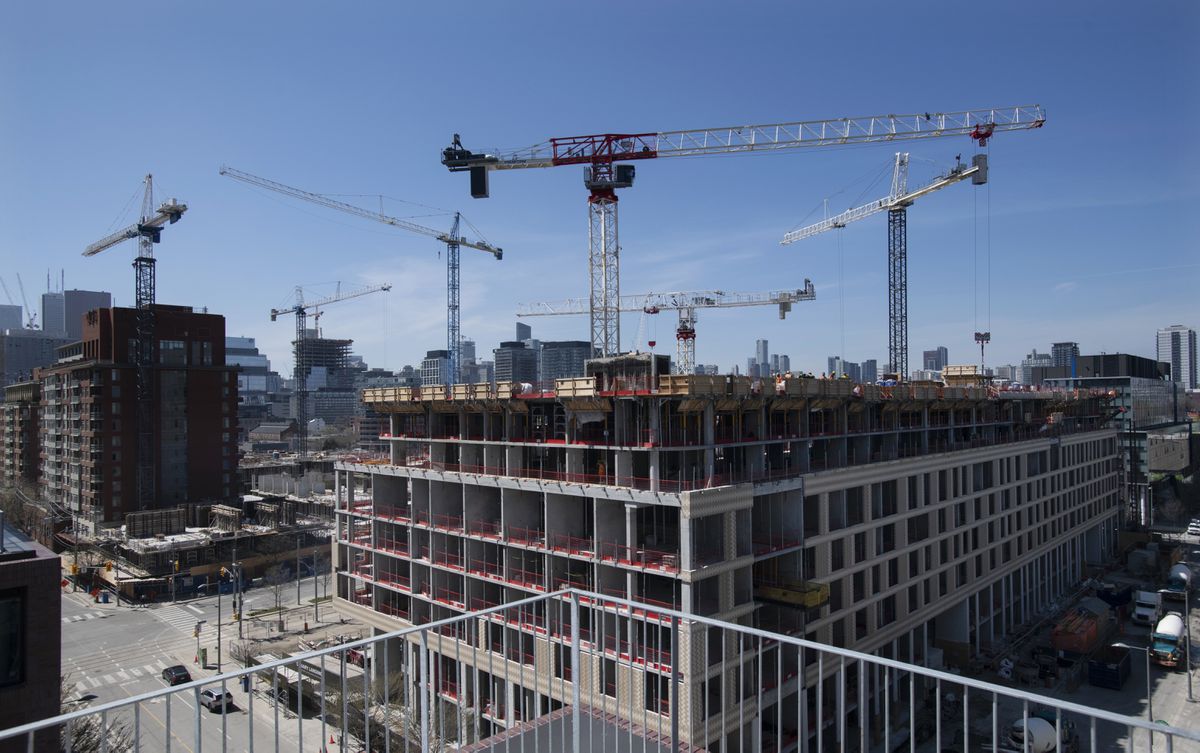Typical G&M flame bait. Blaming immigrants and JT for the immigration policies. Let’s toss in the health care problems too. Why are the liberals doing this to us? Crocodile tears
No mention of speculative investment in housing, greedy landlords jacking up rents, corpo land holdings, foreign land holders, claw backs on infrastructure grants, complicated building laws, red tape and all that.
This tripe from the Postmedia network is more distraction from the real news.
November 2019, Postmedia announced[25] that 66% of its shares were now owned by Chatham Asset Management, an American media conglomerate which owns American Media, Inc., and is known for its close ties to the Republican party.[26] https://en.m.wikipedia.org/wiki/Postmedia_Network
Update: Whoops. Here I’m talking shit about G&M and they are not owned by Postmedia. I’m not a fan, but I did misrepresent the paper, and this article. I suppose that I’m so used to conservative shit, that I might scan articles leaning to the right. I’ll do better.
Im sorry are we reading the same article? It’s clearly saying immigrants are not to blame as growth rates are the same as what they’ve always been and the supply of housing is the actual problem.
So wait, this comment is +20 despite the fact that it’s complete nonsense. I’m not blaming u/willybe since he’s obviously learning a lesson about shooting from the hip and is taking that to heart, but the pile of upvotes says something very bad about the !canada Lemmy community. Our politics may be different from the old /r/Canada community, but it doesn’t seem like we’re any more reasonable than they were.
Okay, you got me. The G&M, the conservative shill piece that it is, put out an article that leads the reader in a couple of circles to come around and ponders this thought…
What can be said about population growth is that it makes the costs of bad policy more apparent. If it means we are now beginning, at long last, to have a serious conversation about the barriers to investment and housing construction that have bedevilled this country for decades, then hallelujah for all those extra people, and let’s have lots more.
As you pointed out the article isn’t blaming increased immigration. But it also isn’t pointing fingers at property for profit. Instead the problem eludes to barriers to investment and housing construction.
Don’t forget so many people moving away from long-term rentals to short term unregulated rentals like AirBNB.
Years ago I remember a whole new apartment building being built in Charlottetown, PEI, that was only greenlit on the condition that it wouldn’t be used for short term rentals, because vacancy was under 1%, and about a week before it was ready for people to move in they changed their mind and decided to use it for short term rentals. A whole building.
It’s long past time that AirBNB was regulated.
Just rental property ownership in general.
You know Postmedia doesn’t own the G&M, right?
Whoops! OMG, that’s embarrassing. Thanks for the heads up
I would slightly rephrase this to “too little housing.” Houses per se is not the answer, because just building more single family houses is not going to solve any problem that isn’t going to be massively outweighed by other problems that are exacerbated, as we’ve seen over the past 70+ years of suburban development. Increasing infill density and allowing for “missing middle” housing and mixed use development is the way to go, at least as far as the problems faced by your downstairs neighbors are concerned. This also must be complemented by prioritization of public transit and active transport as preferred modes of transportation in cities, coupled with redevelopment of parking lots and a moratorium on any new freeway construction, as more traffic lanes always and only ever make traffic worse.
Too many domestic speculators. Up to 30% of Canadians are speculators. That’s fucking gross and needs to be banned/taxed to hell and back.
No mention of the fact that house sizes have almost doubled since the 1960s, while families are smaller than ever.
If it takes as much material to build 2 houses now as it used to for 3-4 houses, that’s not going to help affordability.The biggest factors still revolve around zoning and other restrictions imposed by the municipalities and by extension the provinces.
Housing isn’t as much of a big deal in Winnipeg, but our dingbat premier is still pushing tax cuts that “will fund themselves by stimulating growth”. Meanwhile she’s not even considering rolling back the healthcare cuts that had crippled the system here even prior to Covid.
We also have too few jobs, which makes competition for high-skill jobs that much higher. It’s not ideal. Also, it’s not just too few houses, it’s too few housing including apartments and condos etc.
No, it’s also too many people.
Our highways systems and medical systems are also overwhelmed, it’s not just housing. Build more houses, bring more people, and we just make all the other problems worse if we don’t change something and start to fix/redesign those systems as well.
Are those problems not due to a lack of transit and healthcare investment and program improvements, moreso than a too many people problem? Bc having or taking in fewer people doesn’t address either of those.
Yes, that’s what I’m saying. We definitely need to build more houses, but if we don’t fix those other areas at the same time it will be a nightmare.
Just building houses won’t fix our problems, which means that lack of housing isn’t the main issue it’s too much people. Too many people for our housing supply, too many people for our roads, and too many people for our medical care.
If we build more houses, get more doctors and nurses, and fund public transportation, than we no longer have too many people because we are better built to serve and house more people.
The chart here: https://www.macrotrends.net/countries/CAN/canada/population-growth-rate shows a steady growth rate over the past 70 years. Like you said, that’s not a sustainable model for anything, including housing.
People really need to quit with the ‘single family home with a white picket fence’ bullshit and get more comfortable with medium/high density housing.
Our highway systems have been overwhelmed for over a decade, and they should stay overwhelmed. Stop driving. We should be building more transit instead. But transit is only viable in high density areas, and we don’t have enough of those. So let’s keep bringing in people, and fire all the folks at City Hall telling developers that those people can’t have homes.
But transit is only viable in high density areas
But then isn’t needed because everything is right there. We used to have transit to every little small town. We eventually shut down the lines because the people moved to high density areas which didn’t need transit – people could walk everywhere.
Oligarchy and Plutocracy
When the country is more affected by the decisions of monied interests, corporations and wealthy oligarchs … can you really still keep calling it a democracy?
The problem with housing is that it is no longer being seen, financed or managed as a system to house or shelter people … it’s being managed as another way to squeeze more wealth out of those people that have little to no money for the benefit of those that don’t really need any more wealth than they already have.
Just look at the decision makers of this issue … many of them already own and manage multiple real estate investments and are trying to monetize it themselves … yet they are the ones deciding on what to do about this issue.
It’s not a problem through the actions or mere existence of average people … it’s a problem of wealth and greed.
It’s a terribly disgusting runaway stage four cancer that we are trying to treat with skin cream and essential oils.
This is the best summary I could come up with:
Why are housing prices in Canada so high – fifth highest, relative to income, in the OECD?
Canada’s GDP per capita is no higher than it was in 2017; labour productivity, having fallen for five consecutive quarters, is back to where it was in 2014.
It would be one thing if the supply of either were running flat out – if investment or output or housing starts were at record or even unusually high levels, but still could not keep up with the torrid growth in population.
I suppose it’s possible to connect the relative stagnation of per capita GDP over the past several years to the surge in population over the last two.
Housing starts, at roughly 260,000 annually, are lower now, in absolute terms, than they were in the early 1970s, when our population was barely half what it is today.
If it means we are now beginning, at long last, to have a serious conversation about the barriers to investment and housing construction that have bedevilled this country for decades, then hallelujah for all those extra people, and let’s have lots more.
The original article contains 819 words, the summary contains 185 words. Saved 77%. I’m a bot and I’m open source!
So Canada has 38 million people and 16 million houses, about 2.4 people per house. Average household size in Canada is 2.5, so there is some slack to allow for second homes and vacancy.
Perhaps more houses are needed in the areas where people want to live, but it doesn’t seem like that big of a shortage.
I wonder how many of these are vacation homes or air b&b rentals that sit idle for most of the year?
Up to 30% of Canadians are domestic speculators. Doesn’t matter how much we build when people just buy it up to increase their portfolio. We need a ban on this activity or a very very heavy tax to force them to sell.
that seems a bit self fulfilling, most people aren’t homeless, so of course the average household size is greater than the number of people per house. That doesn’t mean that they are in a happy or affordable position.
That’s exactly my point.
It’s not about a lack of houses in general, but a lack of housing in specific places and a lack of affordability in housing.
And yeah, facts have a way of being kind of obvious when you look at the figures.
You’re working under assumption most homes have people.living in them…
That is a 100% indisputably correct assumption. Vacancy taxes worked where they’ve been implemented to incentivize the occupancy of empty homes and the overwhelming majority of homes have people living in them.
Just one house too few is enough to create an endless bidding war.
No… one house too few can also mean two people somewhere have to become roommates, or a couple that wants to separate holds on a little longer, or someone lives with their parents, or etc etc.
Can we have a Cabadahousing community where we can post these things?
I know it’s an important issue in Canada, but I feel like this is all that is talked about on here.








